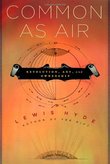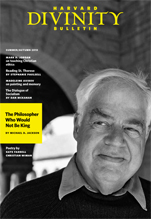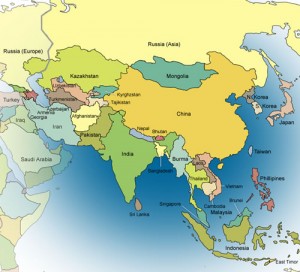
Never trust a Laura Newman vertical. It might be the edge of a house, the tilt of a glass plane, or a door handle; it might indicate a painting within a painting, or a skeletal tree trunk that grew in from somewhere, and, oh, by the way, it also doubles as the cord of a wrecking ball and a stray power line. Newman’s verticals and orthogonals function like unreliable narrators: they fool the eye and throw basic spatial frameworks into question. In her work, closeness looks far away, flat planes might be cut-outs, transparent windows open out to nothingness, clouds act as people, wisps of breeze arise from nowhere, and whole pictures are tilted off-kilter by triangular shims lurking in eccentric corners. Technically speaking, the parallax view is the apparent displacement or difference in the position of an object when it is viewed along the two different lines of sight. Newman pictures the world as a correspondingly parallax place. Newman never settles for a monocular kind of vision or a singular kind of meaning. If you scan your eye down any of her sightlines, you will find recurrent jump cuts and double entendres all along the way.
more from Amy Sillman at artcritical here.
From Salon:
 In her new book, “Delusions of Gender: How Our Minds, Society, and Neurosexism Create Difference,” Cordelia Fine, a research associate and the author of “A Mind of Its Own” (also about brain science), discovers that, far from supporting the existence of vastly different male and female brains, much of the research on the topic is not only deeply flawed, but dangerously misleading. Women aren't worse at math (as Fine proves in the book, bad neurological research is one of the reasons women are still struggling to catch up in the field), and girls' preference for girlish toys probably has more to do with social expectations than what's in their skulls. Fine's book is a remarkably researched and dense work that, even while tackling highly complex subject manner, retains a light, breezy touch.
In her new book, “Delusions of Gender: How Our Minds, Society, and Neurosexism Create Difference,” Cordelia Fine, a research associate and the author of “A Mind of Its Own” (also about brain science), discovers that, far from supporting the existence of vastly different male and female brains, much of the research on the topic is not only deeply flawed, but dangerously misleading. Women aren't worse at math (as Fine proves in the book, bad neurological research is one of the reasons women are still struggling to catch up in the field), and girls' preference for girlish toys probably has more to do with social expectations than what's in their skulls. Fine's book is a remarkably researched and dense work that, even while tackling highly complex subject manner, retains a light, breezy touch.
More here.
From PhysOrg:
 Psychologists have identified the key male dance movements that most arouse female interest — and all are to do with central body motions which send out primal signals of health, vigour and strength. A team led by Nick Neave of Northumbria University in Newcastle-upon-Tyne, northeastern England, filmed 19 men aged 18-35 in a lab as they danced to a standard disco beat. The men, none of whom was a professional dancer, wore reflective markers that studded their body and were filmed by a battery of 12 3D cameras. The footage was used to create a dancing avatar, or animated figure, that was faceless and genderless. Thirty-seven young heterosexual women were then shown 15-second clips of the avatars and were asked to judge which dance movements were the most attractive. Eight “movement variables” emerged which distinguished the trolls from the Travoltas. “Good” dancers did wider and bigger movements of the head, neck and torso, and did faster bending and twisting movements of their right knee (greater movements of the right knee rather than the left were to be expected, as 80 percent of the dancers favoured their right leg). In contrast, “bad” dancers tended to be stiff and plod — and throwing their arms around was no substitute for fast, variable movement of the central body region.
Psychologists have identified the key male dance movements that most arouse female interest — and all are to do with central body motions which send out primal signals of health, vigour and strength. A team led by Nick Neave of Northumbria University in Newcastle-upon-Tyne, northeastern England, filmed 19 men aged 18-35 in a lab as they danced to a standard disco beat. The men, none of whom was a professional dancer, wore reflective markers that studded their body and were filmed by a battery of 12 3D cameras. The footage was used to create a dancing avatar, or animated figure, that was faceless and genderless. Thirty-seven young heterosexual women were then shown 15-second clips of the avatars and were asked to judge which dance movements were the most attractive. Eight “movement variables” emerged which distinguished the trolls from the Travoltas. “Good” dancers did wider and bigger movements of the head, neck and torso, and did faster bending and twisting movements of their right knee (greater movements of the right knee rather than the left were to be expected, as 80 percent of the dancers favoured their right leg). In contrast, “bad” dancers tended to be stiff and plod — and throwing their arms around was no substitute for fast, variable movement of the central body region.
“Men all over the world will be interested to know what moves they can throw to attract women,” said Neave. “We now know which area of the body females are looking at when they are making a judgement about male dance attractiveness. If a man knows what the key moves are, he can get some training and improve his chances of attracting a female through his dance style.”
More here.
Eighty-Five
As I grow older, I feel younger
more eager, more full of love.
More alive the closer I move to death.
More whole the closer I move into blight.
The sweeter life grows as fervent
clamors of youth pass.
Passions of old age take deeper
flavor, ripened, more nuanced.
More easily words and affections
flow when the self-conscious gaucherie
of youth has passed.
Wholeness suddenly is mine;
ragged edges of fear hemmed.
Mirrors say Look. Do not
be afraid. You are what you are.
by Betty Lockwood
from A Matriach's Song
Peter Randall Publisher, 2001
Tuesday, September 7, 2010
 Robert Fisk in The Independent:
Robert Fisk in The Independent:
It is a tragedy, a horror, a crime against humanity. The details of the murders – of the women beheaded, burned to death, stoned to death, stabbed, electrocuted, strangled and buried alive for the “honour” of their families – are as barbaric as they are shameful. Many women's groups in the Middle East and South-west Asia suspect the victims are at least four times the United Nations' latest world figure of around 5,000 deaths a year. Most of the victims are young, many are teenagers, slaughtered under a vile tradition that goes back hundreds of years but which now spans half the globe.
A 10-month investigation by The Independent in Jordan, Pakistan, Egypt, Gaza and the West Bank has unearthed terrifying details of murder most foul. Men are also killed for “honour” and, despite its identification by journalists as a largely Muslim practice, Christian and Hindu communities have stooped to the same crimes. Indeed, the “honour” (or ird) of families, communities and tribes transcends religion and human mercy. But voluntary women's groups, human rights organisations, Amnesty International and news archives suggest that the slaughter of the innocent for “dishonouring” their families is increasing by the year.
Iraqi Kurds, Palestinians in Jordan, Pakistan and Turkey appear to be the worst offenders but media freedoms in these countries may over-compensate for the secrecy which surrounds “honour” killings in Egypt – which untruthfully claims there are none – and other Middle East nations in the Gulf and the Levant. But honour crimes long ago spread to Britain, Belgium, Russia and Canada and many other nations. Security authorities and courts across much of the Middle East have connived in reducing or abrogating prison sentences for the family murder of women, often classifying them as suicides to prevent prosecutions.
It is difficult to remain unemotional at the vast and detailed catalogue of these crimes. How should one react to a man – this has happened in both Jordan and Egypt – who rapes his own daughter and then, when she becomes pregnant, kills her to save the “honour” of his family? Or the Turkish father and grandfather of a 16-year-old girl, Medine Mehmi, in the province of Adiyaman, who was buried alive beneath a chicken coop in February for “befriending boys”? Her body was found 40 days later, in a sitting position and with her hands tied.
 Robin Wells and Paul Krugman in the NYRB:
Robin Wells and Paul Krugman in the NYRB:
If the fundamental problem lay with a crisis of confidence in the banking system, why hasn’t a restoration of banking confidence brought a return to strong economic growth? The likely answer is that banks were only part of the problem. It’s curious that only one of the three books surveyed here so much as mentions the work of the late Hyman Minsky, a heterodox, long-neglected economist whose moment has come—in more ways than one. However, Roubini and Mihm give a good overview of Minsky’s views—and Richard Koo, whether he knows it or not, is very much a Minskyite.
Minsky’s theory, in brief, was that eras of financial stability set the stage for future crisis, because they encourage a wide variety of economic actors to take on ever-larger quantities of debt and engage in ever-more-risky speculation. As long as asset prices keep rising, driven by debt-fueled purchases, all looks well. But sooner or later the music stops: there is a “Minsky moment” when all the players realize (or are forced by creditors to realize) that asset prices won’t rise forever, and that borrowers have taken on too much debt.
But isn’t this new prudence a good thing? No. When one individual tries to pay down debt, that’s all well and good—but when everyone tries to do it at the same time, the consequences can all too easily be destructive for everyone involved. The process of destruction is easiest to see in the financial sector, where everyone’s attempt to pay off debt by selling assets all at the same time can lead to a vicious circle of plunging prices and rising distress. But the problem isn’t necessarily restricted to finance.
Tonight what I need most
is your open hand, a leaf
settling in the small of my back,
undistracted
by the noisy surround of sex,
the lappings of massage,
even your wordy velvet concern.
Just the quiet dapple of fingers mapping
the continent of grief
I can't reach on my own.
by Susan Middleton
from Seed Case of the Heart
Slate Roof Publishing 2007
From The Washington Post:
 In “The Hitchhiker's Guide to the Galaxy,” Douglas Adams famously had his characters ask a computer to provide the ultimate answer to “Life, the Universe, and Everything.” As Stephen Hawking and Leonard Mlodinow point out in their book “The Grand Design,” the computer's response — 42 — was less than helpful. Hawking, who needs no introduction, and Mlodinow, a Caltech physicist with a string of excellent books to his credit, have taken on that ultimate question in a somewhat more rigorous form by asking three related ones:
In “The Hitchhiker's Guide to the Galaxy,” Douglas Adams famously had his characters ask a computer to provide the ultimate answer to “Life, the Universe, and Everything.” As Stephen Hawking and Leonard Mlodinow point out in their book “The Grand Design,” the computer's response — 42 — was less than helpful. Hawking, who needs no introduction, and Mlodinow, a Caltech physicist with a string of excellent books to his credit, have taken on that ultimate question in a somewhat more rigorous form by asking three related ones:
Why is there something instead of nothing?
Why do we exist?
Why does this particular set of laws govern our universe and not some other set?
More here.
From The New York Times:
 Every September, millions of parents try a kind of psychological witchcraft, to transform their summer-glazed campers into fall students, their video-bugs into bookworms. Advice is cheap and all too familiar: Clear a quiet work space. Stick to a homework schedule. Set goals. Set boundaries. Do not bribe (except in emergencies). And check out the classroom. Does Junior’s learning style match the new teacher’s approach? Or the school’s philosophy? Maybe the child isn’t “a good fit” for the school.
Every September, millions of parents try a kind of psychological witchcraft, to transform their summer-glazed campers into fall students, their video-bugs into bookworms. Advice is cheap and all too familiar: Clear a quiet work space. Stick to a homework schedule. Set goals. Set boundaries. Do not bribe (except in emergencies). And check out the classroom. Does Junior’s learning style match the new teacher’s approach? Or the school’s philosophy? Maybe the child isn’t “a good fit” for the school.
Such theories have developed in part because of sketchy education research that doesn’t offer clear guidance. Student traits and teaching styles surely interact; so do personalities and at-home rules. The trouble is, no one can predict how. Yet there are effective approaches to learning, at least for those who are motivated. In recent years, cognitive scientists have shown that a few simple techniques can reliably improve what matters most: how much a student learns from studying. The findings can help anyone, from a fourth grader doing long division to a retiree taking on a new language. But they directly contradict much of the common wisdom about good study habits, and they have not caught on.
More here.

AS AN ARTIST, I HAVE NEVER had an allegiance to any specific medium. In the 1960s, so-called medium-specific art prescribed the limits of what was permissible to express. This was the “repressive face of modernism.” My desire was to find a way to expand the range of philosophical, psychological, political, and visual ideas that my work could engage. New ideas evolved into new mediums. But these new mediums did not arise as mere acts of will. First, they were always contextual, based in actual situations and immediate needs. Second, they were oppositional, intended as an attack on the dominant aesthetic and critical hierarchy. For me, the medium was never transparent, never something to be seen through, never a neutral delivery system. No matter how reduced the means, they always remained something material, something to be taken apart and put back together, something to be confronted.
more from Mel Bochner at Triple Canopy here.

The absurdity of the copyright extension increases the deeper we look into time. Holinshed died only thirty-six years before Shakespeare died, and the distance between the publication of his account of the Scottish regicide and the initial production of Macbeth was less than two decades. Holinshed’s estate could have stopped Will cold, exacting a price and a shared credit that very likely would have inclined him to turn his attention elsewhere. Surely, at this late date, Stephen Sondheim ought to have the same right to compose a musical about Gatsby, which is now more than a third as old as the Constitution that engendered limited copyright protection. Hyde devotes a passage to the familiar horrors unleashed by James Joyce’s malevolent seventy-eight-year-old grandson, Stephen James Joyce, who having no talent of his own has devoted his life and fortune to minimizing his grandfather’s place in the commons. When Ulysses is finally liberated, a great cheer will go up, and in no time at all we will have a more definitive text and competing annotated editions. The only annotated Ulysses at present is the Oxford World’s Classics paperback, which uses the now unprotected 1922 Sylvia Beach edition, and even that can’t be sold legally in the United States. (See previous reference to Amazon UK.) What kind of commons have we fortressed when a novelist could be sued several times over for writing a story in which Jake Barnes, Millicent Bloom, and Mickey Mouse indulge in a three-way at 7 Eccles Street, entangled on a bedsheet reproduction of Matisse’s Le Bonheur de vivre (photo provided), while George and Ira Gershwin’s greatest hits (lyrics provided) play on the radio.
more from Gary Giddins at Bookforum here.

Since cities first got big enough to require urban planning, its practitioners have focused on growth. From imperial Rome to 19th-century Paris and Chicago and up through modern-day Beijing, the duty of city planners and administrators has been to impose order as people flowed in, buildings rose up, and the city limits extended outward into the hinterlands. But cities don’t always grow. Sometimes they shrink, and sometimes they shrink drastically. Over the last 50 years, the city of Detroit has lost more than half its population. So has Cleveland. They’re not alone: Eight of the 10 largest cities in the United States in 1950, including Boston, have since lost at least 20 percent of their population. But while Boston has recouped some of that loss in recent years and made itself into the anchor of a thriving white-collar economy, the far more drastic losses of cities like Detroit or Youngstown, Ohio, or Flint, Mich. — losses of people, jobs, money, and social ties — show no signs of turning around. The housing crisis has only accelerated the process.
more from Drake Bennett at the Boston Globe here.
Akeel Bilgrami in The Immanent Frame:
 Jane Bennett’s sympathetic yet critical commentary on my essay ‘What is Enchantment?’ (published in the volume Varieties of Secularism in a Secular Age) describes the notion of disenchantment that I present as primarily addressing the theological displacements that emerged with the rise of the new science. Her own work, she says, offers a quite different focus, one of a mood or affect that ‘circulates between human bodies and the animal, vegetable, and mineral forces they encounter.’
Jane Bennett’s sympathetic yet critical commentary on my essay ‘What is Enchantment?’ (published in the volume Varieties of Secularism in a Secular Age) describes the notion of disenchantment that I present as primarily addressing the theological displacements that emerged with the rise of the new science. Her own work, she says, offers a quite different focus, one of a mood or affect that ‘circulates between human bodies and the animal, vegetable, and mineral forces they encounter.’
I don’t doubt that this interesting focus is quite different from mine, though I think it would be wrong to represent my view as being focused on the theological. In my analysis, the theological had only a central genealogical role to play in the process of ‘disenchantment’. But, I had argued that the fallout of the theology—once the theological transformations were exploited in alliances forged between established religious interests, commercial interests, and the mandarin interests of organized scientific bodies (such as the Royal Society)—was impressively diverse, ranging from transformations in political economy to political governance and, further yet, to the mentalities of human culture in its relation to the natural world. So the focus, if any, on the theological was intended wholly to emphasize that, unlike purely materialist accounts, I was following more refined Marxists like Christopher Hill, who had written of the importance of the conflict of religious ideas in shaping the period of history in which I had invested my genealogical efforts.
More here.
Monday, September 6, 2010
 Hello,
Hello,
The period for nominating entries is over.
To see a full list of the nominees and then vote, go here.
To see details of the prize, go here.
Good luck to all!
The voting round closes on Wednesday, September 8, 2010, at 11:59 pm NYC time.

Barbara Norfleet. Am I Pretty. From “Insects”. 1993.
More here and here.
Sunday, September 5, 2010
 Corey McCall in Other Voices:
Corey McCall in Other Voices:
Readers of Foucault’s texts have long been perplexed by the apparent shift his writings underwent in the late 1970s. Following the appearance of the first volume of The History of Sexuality (Le volunté de savoir, translated as The History of Sexuality: An Introduction) in 1976, Foucault’s investigations inexplicably change focus: from an investigation of the prison and the mechanisms of power that produce the modern individual in Discipline and Punish, the second and third volumes of the History of Sexuality focus on practices of the self in ancient Greece and Rome. Indeed, at the time of his death, Foucault was at work on a fourth volume examining the practices of the self in the Christian era.1 How does one account for the fact that the thinker who had written in 1966 that the one could “certainly wager that man would be erased, like a face drawn in sand and at the edge of the sea” was suddenly writing about the various practices of the self prevalent in the ancient world, practices that were meant to ensure individual freedom and autonomy?2 This, after all, was the thinker that had famously feuded with Jean-Paul Sartre and labeled him an outmoded thinker of systems, better suited for the nineteenth century than the twentieth, who was now writing about themes seemingly much more at home in Existentialist writings than his own anti-humanist ones.
Eric Paras’ book represents the latest attempt to come to terms with this perplexity. What sets Paras’ work apart from previous attempts is the archival work that he marshals in support of his bold claim. Paras has done extensive research in the Foucault Archives, and he uses this research to claim that Foucault basically renounces his former, anti-humanist self in order to begin a project that resonates with certain core humanist values such as freedom and universal human rights. Foucault’s work after 1976 until his premature death in 1984 represents not an attempt to reassess his former positions and provide them with more depth, as some have argued.3 Instead, Foucault’s later writings enact a radical break from the doctrines he previously held. According to Paras, Foucault sought a position “beyond power and knowledge” and found it by delving into various ancient practices of self-cultivation. I am sympathetic to the more moderate claim that Foucault’s later writings represent an attempt to make good on the genealogical claims of his earlier texts and thus are continuous with his previous work rather than an outright renunciation. In the review that follows, I will attempt to outline this case as an alternative to Paras’ more radical claim. Despite the fact that I take issue with the author’s central thesis in the review that follows, Paras’ book stands as a worthy attempt to make sense of Foucault’s sometimes maddening intellectual odyssey.
 Michael D. Jackson in The Harvard Divinity Bulletin:
Michael D. Jackson in The Harvard Divinity Bulletin:
That any philosophy mirrors the life of the philosopher is an assertion from which many thinkers would recoil, since it seems to reduce thought to the prejudices, preoccupations, and persuasions that supposedly characterize the musings of mere mortals. If every great philosophy is, as Nietzsche avows, “an involuntary and unconscious memoir” reflecting who the philosopher is before he or she takes up philosophy, then thought is but an adventitious byproduct of one's life rather than the disciplined, disinterested work of reason. I thought of Nietzsche when I first met Richard Rorty. There was something disarmingly vulnerable about him. Though renowned for his groundbreaking Philosophy and the Mirror of Nature and his MacArthur “genius award,” he seemed socially unsure of himself, and nonplussed whenever the talk turned from academic to mundane matters like Australian wines, the films of Werner Herzog, or the best Vietnamese restaurant in Canberra.
It was 1982. The Humanities Research Centre at the Australian National University. We were there on visiting fellowships—myself, Dick Rorty, Don Hirsch, Zygmunt Bauman, Paul Connerton, Russell Keat, Patrick McCarthy, and others I got to know less well. I was writing essays on embodiment, profiting from long conversations with Paul, who was writing his book on bodily social memory, and Russell, who was preparing his critique of Maurice Merleau-Ponty's Phenomenology of Perception. It was my hatha yoga practice that had inspired my explorations of body consciousness; unfortunately, it had also turned me into an obnoxious fundamentalist who believed that the respiratory and psychophysical disciplines of yoga enabled one to achieve a truer and more realistic relationship with the world, and that discursive thought was largely illusory. Rorty objected to the essentialist overtones of my view, arguing that efforts to ground knowledge in the body or the mind, in reasoned discourse or strong intuition, were equally misguided. And he cautioned me against explaining any human experience in terms of some prior cause or first principle. In my defense, I pointed out that a philosophical argument against foundationalism could not be transferred to the real world, since all human beings have recourse to notions of firstness, foundations, and fundamentals in their everyday lives. If it is existentially the case that life is insupportable without such notions, what is the point of making philosophical arguments to the contrary? Moreover, I felt that the Deweyan argument, to which Rorty subscribed, against Platonic dualisms like body-mind, true-false, and subject-object left unconsidered the way we deploy these antinomies to capture different modes of experience. Making epistemological claims for such distinctions is absurd, but recognizing the phenomenological differences they communicated was, I thought, vital to understanding human experience.
I suppose I was ineptly asking whether philosophy has anything to say that might make a real difference to our lives, and whether its insights had value only within the academic circles where they served as currency. I quickly learned that these were also burning questions for Rorty, for beyond the philosophical issue of whether we can ever truly represent what lies outside our minds—whether human thought can mirror nature—lies the much more pragmatic issue of whether the insights of thinkers can change the world.
 Achin Vanaik in For Liberation:
Achin Vanaik in For Liberation:
The mass of recent literature on the ‘rise of Asia’ largely focuses on the implications of this development for the West. [1] It rarely stops to consider the impact on inter-relations between the Asian states themselves. In Rivals, ex-Economist editor Bill Emmott attempts to correct this by examining the cases of China, India and Japan, and argues that the interaction between the three will decisively influence the shape of the coming world order. As he points out, their triple coexistence as major powers represents a historical novelty. In 1820, when China and India between them accounted for almost half of world output, Japan remained a relative backwater, its modernizing drive of the Meiji period lying decades in the future; by the 1930s, when Japan had become a full-fledged industrial and military power, China was impoverished and riven by warlordism, while India groaned under the British yoke. The headlong economic development of the prc and steady growth in India over the past decades suggest that the two Asian giants will join Japan among the top five national economies in the world.
Yet this very process is creating ‘disruptive transformations’ that will profoundly alter the economies, societies and polities of the states in question, Emmott argues, potentially raising new tensions between the three. Rising prosperity has brought commensurate expansion of Chinese and Indian global ambitions. The coming years will see intensifying competition over resources and markets, not least in the battle for Burmese oil and gas fields. In addition, Emmott sees an incipient arms race developing, in a region littered with potential flashpoints. As well as territorial disputes—over Aksai Chin and Arunachal Pradesh in the case of China and India, and over the Senkaku and other islands in the case of China and Japan—there are further sources of tension in Tibet, Taiwan, the Korean peninsula, Pakistan and Kashmir, which the deteriorating world economic outlook will likely only heighten. Emmott proposes a ‘plausible pessimistic’ scenario: China’s bubble-prone economy enters a deep recession, accompanied by rising social protests; the ccp tightens its grip with increased recourse to nationalism, amplifying regional tensions through displays of truculence. With Japan too bolstering its military, Taiwan might become the cause of a ‘short, exploratory exchange of fire’ that could also draw in the us.
